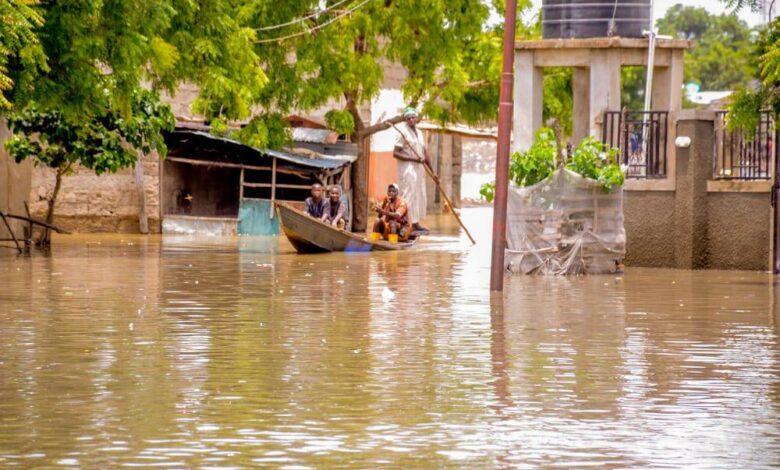Water Released From Cameroon’s Lagdo Dam Causing Fresh Displacements In Northeast Nigeria – IOM
Months of torrential rains have caused unprecedented flooding in parts of northeast Nigeria which were recently made worse by the release of water from Cameroon’s Lagdo Dam.

Flood water has forced nearly 40,000 more people from their homes in parts of Northeast Nigeria since September, and at least 100 have died or been injured, according to UN officials tracking the situation.
In September, Cameroonian authorities opened overflow spillways at Lagdo Dam to ease the pressure on the dam from the rising reservoir.
The releasing of water from the reservoir into the Benue river has worsened the flooding downriver, officials from the UN’s International Organization for Migration (IOM) said.
Floods from months of heavy downpours in the region had already displaced many people.
More than 39,500 not already in IDP camps, have been displaced by the floods, the IOM in Nigeria said in a statement shared with HumAngle.
At least 15,000 people who were already Internally Displaced Persons (IDPs) in Northeast Nigeria “are in immediate need of shelter and food due to floods which destroyed their camps,” the statement said.
IOM’s Public Information Officer, Stylia Kampani, said the situation has caused his organisation to commence the provision of “emergency shelter and other assistance to some of the tens of thousands affected by the ongoing deadly flooding in the region.”
Quoting IOM’s Displacement Tracking Matrix, (DTM), Kampani read out that at least 120 people in Bauchi State, Northeast Nigeria, had “died or were injured due to extreme weather conditions between 1st and 12th Sept.”
“Heavy rainfall and strong winds have caused serious damage to shelters and infrastructure in camps and other sites for IDPs since the onset of Nigeria’s rainy season in June,” the information officer said.
“IOM is providing relief items including blankets, kitchen sets, mattresses and floor mats, and will also provide emergency shelter to more than 1,500 internally displaced persons. However, funding remains a major challenge to scaling up the response,” the communique reads.
Food Shortage Looms
This year’s unprecedented flooding in most parts of crisis-ridden northeast Nigeria may lead to serious food shortages, especially in locations where the flood washed over farmlands.
“Due to the extent and nature of the floods, if adequate actions are not taken now, the well-being of IDPs will be gravely impacted,” IOM Acting Chief of Mission in Nigeria, Prestige Murima, was quoted to have said in the statement.
“Flood-prone communities could face protracted food insecurity if their farmlands are affected,” Murima said.
The Migration organisation has said that flash floods that started in June this year have destroyed farmlands, shelters and sources of livelihood in various communities of Borno, Adamawa and Yobe states.
Six camps hosting 15,618 IDPs in Borno state were destroyed by the flood, the IOM said. This situation has increased the dependence of the affected populace on humanitarian assistance.
“Some IDPs are living temporarily with relatives in nearby camps and public buildings such as schools and markets,” the statement said.
The Office for the Coordination of Humanitarian Affairs, (OCHA’s) latest Humanitarian Needs Overview, (HNO), IOM has indicated that “8.4 million people in the north-east states of Borno, Adamawa and Yobe require humanitarian aid in 2022 alone.”
“The 12-year conflict in the region has spread to areas surrounding Lake Chad, causing one of the world’s most severe and complex humanitarian crises.”
The IOM statement noted that “ahead of COP27 in November, floods in Nigeria show there is a need to be prepared for the scale and scope of the climate crisis by investing in local anticipatory actions, emergency preparedness and camp coordination, camp management, people-centred approach and improved access to financing for communities and local stakeholders who are at the forefront of climate change.”
Support Our Journalism
There are millions of ordinary people affected by conflict in Africa whose stories are missing in the mainstream media. HumAngle is determined to tell those challenging and under-reported stories, hoping that the people impacted by these conflicts will find the safety and security they deserve.
To ensure that we continue to provide public service coverage, we have a small favour to ask you. We want you to be part of our journalistic endeavour by contributing a token to us.
Your donation will further promote a robust, free, and independent media.
Donate HereStay Closer To The Stories That Matter




